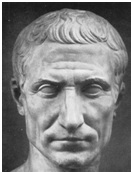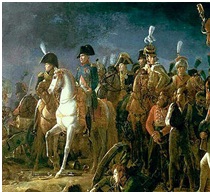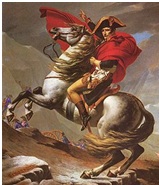|
 |
|
 |
Napoleon Bonaparte Leadership
Napoleon Bonaparte (1769-1821)
For more detail see... The Battle of Waterloo in the History Highlights section.
Why was he a great general?
1. Intelligence, intuition and intensity
a) intelligence He had a great memory so he could remember
b) intuition He instinctively knew the best time to attack . This resulted from years of experience studying military strategy - see point 2. He said that victory depended on “the instantaneous flash of an idea”.
c) intensity He was totally focused on success but had the ability to shut out his problems and so get enough sleep.
2. Learning and support Napoleon: a) was a dedicated student of military strategy. b) learned much from the great generals of the past (particularly Julius Caesar, pictured right). He used their tactics and invented only a few of his own like:
He also:
3. Deception Days before the Battle of Austerlitz, he encouraged his opponents to attack, fooling them that his army was weak and he wanted peace. They were then surprised by the strength of Napoleon’s army.
4. Attacking the enemy’s weaknesses He a) used spies to find out and exploit the enemy’s weaknesses b) surprised the enemy by concealing his own battle plan and troop deployments. “Never interrupt your enemy when he is making a mistake”, he said.
5. Planning and decisiveness Successful strategy, he said, was based on: “Strength, activity and the firm resolve to die gloriously”. He worked out his battle plan and stuck to it, even if his generals didn’t like it. At Austerlitz (pictured right with Napoleon on his white horse), they even suggested a retreat. But he went ahead with his plan to attack the enemy’s severely weakened centre, having encouraged them to divert their troops to his right flank by weakening it. He always saw a battle as a whole - how?
His problem was (as at the Battle of Waterloo) that his generals sometimes let him down and needed more supervision.
6. Speed and surprise His plan was always to attack with great speed, exploiting the strength of his cavalry. At the Battle of Austerlitz he used troops, who marched from Vienna 70 miles away in only two days to support his right flank. Their speed and surprise arrival were crucial to his victory. “Strategy is the art of making use of time and space”, he said. Time was most precious to him, because it could never be recovered So he organized his army into self-reliant corps (of 15,000-30,000 men) to maximize flexibility and speed. Time's importance was shown at the Battle of Waterloo by his delayed attack on the Duke of Wellington (pictured right) that allowed the Prussian (German) army to help the British.
7. Ruthlessness He let nothing get in the way of total victory and the crushing of the enemy. At Austerlitz he bombarded the ice which the Russians were retreating on, and hundreds of them died in the freezing cold water.
8. Hard work and ambition He believed in:
“All my life I have sacrificed everything, peace, self-interest, happiness, to my destiny”, he said.
9. Purpose, power and propaganda
a) purpose Supported by his first wife, Josephine (pictured right), Napoleon dedicated his life to his career (see point 8)
b) power His lust for power and glory made him great. “Power is my mistress”, he said.
c) propaganda He effectively used propaganda to exaggerate his achievements and belittle his opponents.
10. Motivating his men Napoleon (pictured right in Jacques-Louis David's portrait) inspired great loyalty from his troops - why? They respected him because he:
He believed that the most important motivators were:
a) fear (whilst keeping hope alive).
b) self-interest He gave his men good food when possible. “An army marches on its stomach”, he said.
c) spirit To inspire someone, he believed, “you must speak to his soul”.
d) reward He promoted people for loyalty, bravery and competence. An average 50,000 French deaths per year meant quicker promotion for the rest of the army.
e) short inspirational speeches Once he just said “Soldiers, make me proud of you!”.
f) praise for performance (with criticism and punishment of incompetence).
Key quotes on leadership A leader is a dealer in hope.
Key quote on motivation There are two forces that unite men – fear and interest.
Key quotes on success Ability is nothing without opportunity. He who fears being conquered is certain of defeat.
Key quote on death Death is nothing, but to live defeated and ingloriously, is to die every day.
Key quotes on war and strategy In warfare, the mental to the physical is as three is to one. The art of war is a simple act; everything is in the performance. Never interrupt your enemy when he is making a mistake. Victory belongs to the most persevering.
Key quote on the learning organization You must not fight too often with one enemy, or you will teach him all your art of war.
Key quote on influencing people The people to fear are not those who disagree with you, but those who disagree with you and are too cowardly to let you know. Greatness is nothing unless it be lasting.
Key quote on happiness We must take things as we find them, and not as we wish them to be.
Key quote on the past, present and future The stupid speak of the past, the wise of the present and fools of the future.
Key quote on politics and government In matters of government, justice means force as well as virtue |
|
|
||
|
|
|
||
|
||
| Copyright © wisdomtowin.com All Rights Reserved | ||
|






 with support
with support
